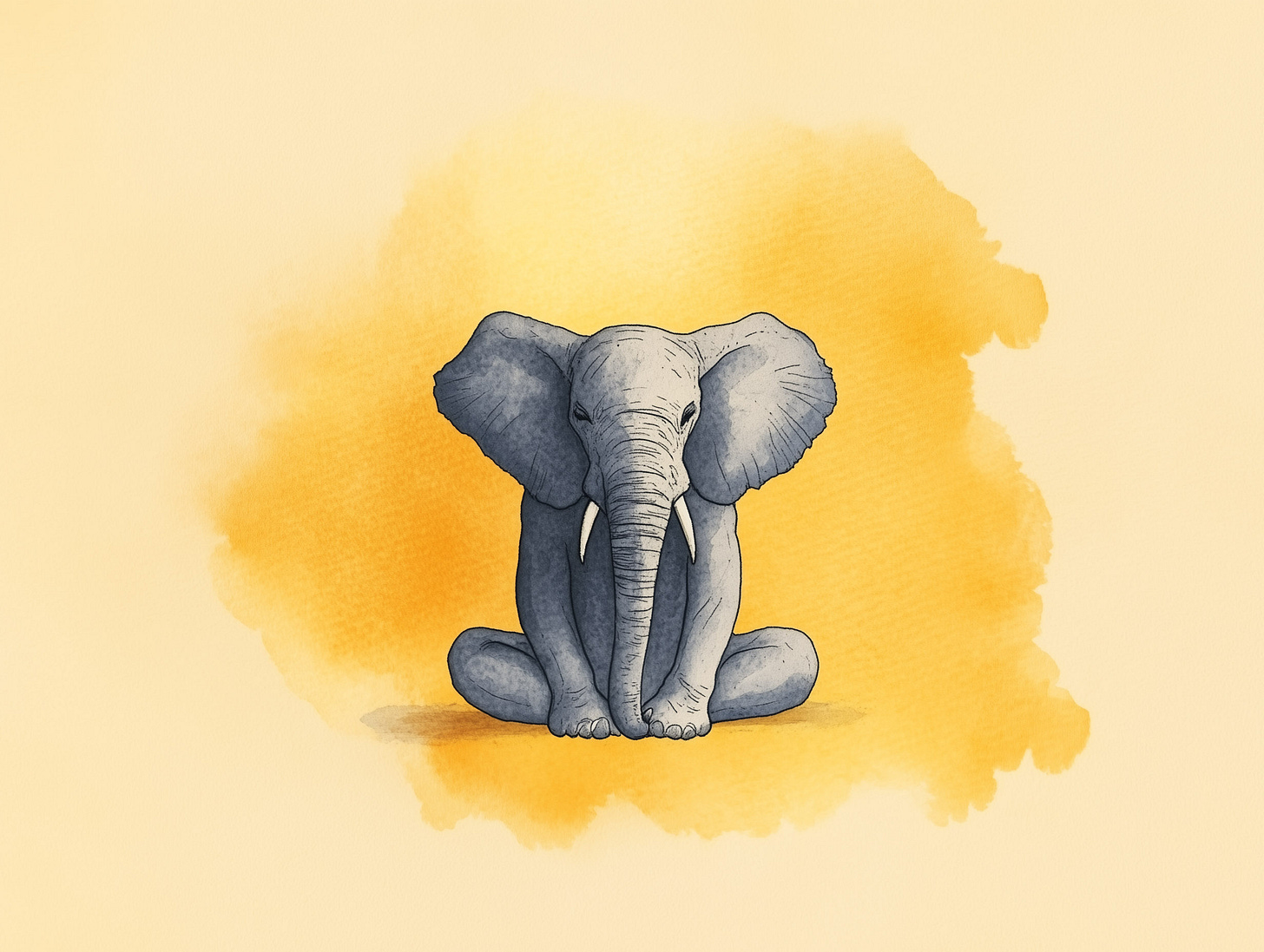One of the cruel ironies of the human experience is that our brains do not allow us to think clearly while we’re upset. This means that we can’t solve problems while we’re upset about them. Many of our issues, both individually and societally, stem from this fact.
To put it another way, stress makes us stupid. The more stressed we are, the more stupid we get. Neuroscience proves it.
Meet the Limbic System
When we’re calm, our body sends resources to the more evolved, outer layer of our brain - the cerebral cortex. This allows us to play board games, design jet engines, and make snarky comments on the internet.
As soon as our calm is disturbed by a stressor, our body diverts resources from the cerebral cortex to the deeper structures: the cingulate cortex, hypothalamus, amygdala, and other components of what is collectively referred to as the limbic system.
The limbic system has one job: survive. It developed in a time before board games, jet engines, and the internet. It is finely tuned for the age of starvation, savage invaders, and being shunned by the tribe. Those threats - and others of a similar vintage - are the buckets into which it categorizes the things that upset us today.
This is why the meeting that makes us miss lunch, the unfamiliar car in the driveway, and the disapproval of strangers on social media triggers us on such a primal level. To the limbic system, the missed meal is a warning that we will never again find food, the unexpected visitor is a mortal threat, and the critical comments suggest that we will be sent, defenseless and alone, to die in the wasteland.
Elephant and Rider
There are many clever analogies that describe the interaction between the cerebral cortex and the limbic system. A good one is that of elephant and rider. As long as the elephant is calm, the rider can harness the massive power of the brain for his own goals. But if the elephant gets upset, the rider doesn’t stand a chance of controlling it.
Not coincidentally, our modern lives are fundamentally incompatible with elephants, and most of us have no idea how to ride one. This means we don’t respond effectively to either real threats or not-so-real threats.
Real Threats
Our ancestors, who were much more accustomed to riding elephants than we are, were able to survive because the limbic system worked for them. When faced with a serious threat, their heart rates would spike up to around 125 bpm. Today, this is thought of as a target zone for athletic performance, because it’s the point at which your senses and physical capabilities are at their peak.
We, on the other hand, do not function at our best when faced with a serious threat. In a true emergency, a typical, untrained person’s heartrate can shoot up to 200 bpm, at which point coordination, memory, and reasoning all go bye-bye.
For example, in 1985, a plane en route from Greece to Manchester caught on fire on the runway. The pilots aborted the takeoff, and the 131 passengers had four minutes to evacuate — plenty of time, if they had lined up nicely and marched out the exits. But, because many of them panicked and tried to get out at the same time, 53 of them died.
Not-So-Real Threats
Thankfully, most of our daily lives do not involve plane crashes or other survival situations. Our problems are usually interpersonal conflicts, financial stressors, or everyday inconveniences like plumbing leaks, car problems, and traffic jams.
Unfortunately, the elephant only has a few buckets to sort things into, and since the limbic system is perfectly suited to a time when interpersonal conflict could lead to having your skull crushed, a lack of resources meant the agony of starvation, and faulty shelter would cause hypothermia, those little problems still feel very big.
As a result, many of us spend far too much time in the state of low-grade limbic arousal we refer to as anxiety. We constantly feel unsafe, respond with strong emotion to relatively trivial situations, and are continually preoccupied by thoughts and concerns.
The elephant in our brain is not doing us any favors.
Empowering the Elephant
If there were an easy way to reprogram our brains so that the limbic system wouldn’t hijack our mental resources at the slightest provocation, everybody would do it. Unfortunately, we do the exact opposite: by constantly worrying and trying to distract ourselves from worrying, we inadvertantly program our brains to be more reactive, more susceptible to being triggered, and less capable of handling challenges effectively.
We do this, in large part, through our use of technology. Researchers such as Jonathan Haidt, author of The Anxious Generation, have extensively documented the ways that the overwhelming stream of information, stimulation, and social pressure that characterize modern life are undermining mental health. Every time you pick up your phone, you’re poking your elephant.
Even without technology, most of us approach our problems the wrong way. As Judson Brewer, psychiatrist and author of Unwinding Anxiety, puts it, “we can’t think our way out of anxiety.” Instead, according to Brewer and other neuroscience researchers, such as Shirzad Chamine, the key is to stop thinking. Or, more accurately, to stop thinking in a way that provokes the elephant.
Here’s what that means: anything we do to try to restrain the elephant only makes it more certain that it has to protect us. Substance abuse, “retail therapy,” overeating, and online diversions actively make things worse. Deep breathing, exercise, and other healthier forms of self-soothing are okay as far as they go, but they still don’t address the root problem. Paradoxically, we have to let the elephant figure out that it isn’t helping.
This may sound terrifying. The elephant is uncontrollable and destructive. When it takes over, it throws the executive center of our brain out of the driver’s seat and tramples everything in its path. We panic, explode in anger, or switch into a state of numbness that’s helpful for reducing the pain of certain death. It feels like trying to think things through is the only way to hang onto the bridle long enough to climb back into the saddle.
But acting on that instinct to keep thinking is exactly what keeps the elephant on its rampage.
All Roads Lead to Mindfulness
The research findings are clear and unequivocal. The best way to keep the elephant from taking over is by practicing mindfulness. This means recognizing our feelings of distress instead of resisting them, examining the sensations that arise within us instead of hiding from them, and observing the thoughts that emerge instead of engaging with them. By getting curious about what’s happening inside us rather than fighting it, we allow the elephant to see for itself that its response is disproportionate and unhelpful.
Another dimension to the elephant analogy is the idea that elephants have long memories. The limbic system isn’t just the part of our brain responsible for survival, it also governs the formation of habits. If, under stress, you find yourself reacting the same way over and over, you can thank your elephant. Becoming more mindful of these undesirable responses - what Dr. Brewer calls “habit loops” - help the elephant recognize that its behavior is hurting rather than helping.
Your elephant wants to protect you. It doesn’t want to make things worse. If you find yourself running for your life, you’ll be glad you have it. So stop trying to control it. Instead, pay attention to what it’s doing. Get curious. It will see what you see, and, over time, it will abandon the unhelpful habits and the survival-based overreactions that cause more problems than they solve.
Stress makes you stupid, so do something smart: shift your focus from the content of your mind to the feelings within your body; from the situations that provoke you to the way you habitually respond to them; and from struggling to control your elephant to gently letting it find a better way on its own.








Great analogy!
I don't eggsactly practice "mindfulness" (I just try ta keep makin' that ol' fashioned lemonade...) BUT I have learned that if ya make nice with yer inner elephant (kinda tantamount ta what yer sayin') ya fare far better...
I'll share a real life example too! So... my hubby as a kid knew a kind an' perky lady that did PR fer Ringling Bros. an' he got ta go backstage an' "meet" the elephants quite a few times as he was growin' up-- He learned (contrary ta popular PETA-like politicized publicity) that R.Bros had begun usin' positive / clicker trainin' (treats, rewards only good stuff!) fer literally decades to be able to work with the elephants SAFELY (they abandoned that cursed "hook" back in the 40s) so fwiw as a tangent that whole movement ta close down circuses was a con (just as they're figgerin' a way to closed down live entertainment, museums/moo-see-ums etc for similar baloney-like motives--ultimately ta strip down our sense of wonder an' culture ta VR simulations which reduce who we are... tangent ovuh) BUT/anywhoo, those elephants were HAPPY to work with humans an' his friend the PR laydee would have the elephant lift her up an' hold her there--as the display of affection was mutually enjoyed by herself, the elephant, an' my hubby as a big-eyed kid. --Were talkin' bout a tiny laydee--barely 5' tall -- who never felt unsafe with the elephant (now on the subway at night yes, she'd feel unsafe, but bein' lifted up by a massive pachyderm, nix!) and again, she did this all the time). For the little schtick she'd give a big smootch on his wrinkly cheek; clearly her circus pals had shown her how ta do this safely but I think as ya said, there was once a connection an' like with dogs--one of mutual benefit!
SO... circus folks (the responsible ones which were the norm in the USA at least) stopped usin' force & hooks (that poked the pachyderms!) an' thus humans (tho' careful not ta step where an elephant could stomp on them by accident which could be deadly) learned a Kipling-like lesson that most "jungle-out-there-fearful" phone-obsessed easily triggered fools never larned--calm 'round BIG issues or ideas however "menacin'" or intimidatin' they may seem, kindness (some of these triggered folks are the nastiest cusses 'round), an' too that we are TOTALLY capable of keepin' a level head 'round them humongous elephants, "real" an' metaphorical!
(fwiw I think the current situation is not unlike provokin' STAMPEDE of angry elephants... folks are sharpenin' spears fer the comb-over ELELPHANT that appears to have won the "election" an' my are they all riled up an' sore! I'm wartchin' the self-indulgent waterfalls of crocodile tears an' real conniptions!)
if the Brooklyn Bridge kin stand 21 elephants--an' my indeed it did! then we all kin too!
(an' god bless PT Barnum AND the circus!)
https://www.mirror.co.uk/news/us-news/how-21-elephants-solved-panic-29987204
Nice post, Alex. I have 99% negative emotionality on the Big 5 personality test ( https://www.outofservice.com/bigfive/ ), so this post resonates. Too much phone addiction is part of it, although genetics plays a role too and I also feel more *alive* when anxious. I have a couple books on phone addiction to read, and will add your books on anxiety to the list. When I get overwhelmed what I try to do is develop tunnel vision to only focus on the task at hand; I can only do what I can do, right?
It's also interesting you state "Instead, pay attention to what [stress is] doing. Get curious." Because this perspective is turning me to focus on Carl Jung's incorporation of the unconscious, the blending of one's thinking, feeling, senses and intuition together into a synergistic and higher-level whole, and toward the individuation process...